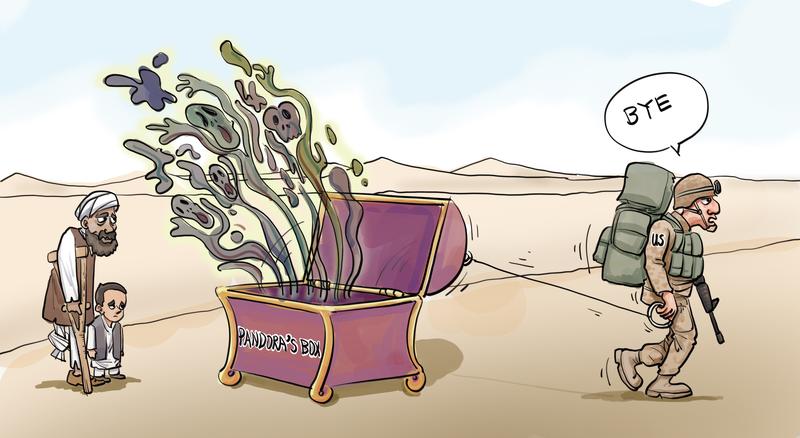 (JIN DING / CHINA DAILY)
(JIN DING / CHINA DAILY)
The public suffering in Afghanistan continues with the economic and security crisis deepening after the resignation of Zalmay Khalilzad as the US special representative for Afghan reconciliation in October following his failure to help the international community reach a consensus on the Afghan peace process and the intra-Afghan dialogue hitting a dead end.
As we enter a new year, the democratic and economic achievements, gained over the last couple of decades thanks to the heavy sacrifices made by the Afghan people, continue to crumble since the downfall of the Afghanistan republic. Mass unemployment and abject poverty have followed the collapse of the Ashraf Ghani administration, and private and state-owned banks are running out of cash and the banking system is on the verge of a breakdown.
International aid agencies have warned that more than half of Afghanistan's population will face hunger. And while inflation rises unchecked and the economy continues to decline, global aid that made up 75 percent of the previous government's budget has dried up.
After the return of the Taliban to power, a large number of men and women, who were the breadwinners of their families, have lost their jobs and can be seen in front of bakeries in Kabul in the hope that some passersby would buy them a piece of bread. Many people are worried about the lack of food and clothing, while the number of beggars in cities continues to rise.
Moreover, instability has marked the return of the Taliban to power. The Islamic State-Khorasan Province has continued its deadly attacks, mainly on the minority Shia community. Shia mosques have come under two deadly suicide attacks during the Friday prayers-in Kunduz province on Oct 8 and in Kandahar province on Oct 15-both claimed by IS-KP. And explosions have become a frequent affair in Kabul City.
The continuing IS-KP attacks indicate the group-which entices and recruits hardliners from the Taliban and unemployed youths-is trying to drag the Taliban into another war. The IS-KP has become a "security" challenge for the Taliban and a threat to regional stability. The IS-KP's recruitment drive and attacks could trigger widespread civil unrest, turning the country into a battlefield once again. If that were to happen, neighboring states, mainly Pakistan and Iran which are already affected by the exodus of Afghan refugees, will not be immune to the spillover effect.
The United States, on the other hand, has been pressing the Taliban to form an "inclusive government" with all ethnic groups on board and respect human rights, especially women's rights, by freezing Afghanistan's funds and not recognizing the Taliban government. The Taliban, on their part, demand that the US recognize their government and release the financial assets of the Afghanistan central bank.
As such, their two-day meeting on Nov 29-30, in Doha, Qatar, where the two sides discussed economic, political, security and humanitarian issues, concluded without any substantive results.
That monopolization of power and exclusion of other ethnic groups from the government will trigger civil unrest, prolong the economic crisis, and prevent international recognition is self-evident. So the Taliban have to form an inclusive government and devise economic policies aimed at creating jobs and alleviate poverty, in order to earn overall public support.
Yet it is important that the US unfreeze Afghanistan's assets and support the country on humanitarian issues, so that ordinary Afghans can improve their lot. However, the unfreezing of Afghanistan's assets, even doubling of humanitarian aid, is unlikely to mitigate poverty in Afghanistan.
The past year was extremely hard for Afghanistan, with the United Nations warning that the country's GDP will shrink by 20 percent within a year following the Taliban's takeover, leading to one of the worst financial meltdowns in history. According to the UN Development Programme, Afghanistan's per capita income might have declined from $500 in 2020 to $350 in 2021 and nine out of 10 Afghans might have fallen below the poverty line. Also, more than half of the 39 million people in the country are in dire need of food assistance.
To end the humanitarian crisis, the Taliban have to work out a long-term economic plan, attract foreign investment and create jobs for all Afghan people regardless of their race, color, creed and gender. And since a peaceful and stable Afghanistan is critical to regional peace and economic development, all stakeholders should come forward with humanitarian and economic aid for the country.
Afghanistan's instability also indicates that the Taliban alone cannot fight the IS-KP and its affiliates. Therefore, there is a strong need for international peacekeeping forces to be deployed to end the instability in Afghanistan and establish peace and security in Afghanistan.
The author is a political analyst and senior writer with Daily Outlook Afghanistan.
The views don't necessarily reflect those of China Daily.


